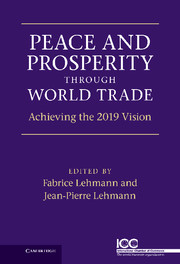Book contents
- Frontmatter
- Contents
- Notes on contributors
- Foreword
- Preface: the ICC vision
- Historical overview and dynamics
- Editorial note
- A Global systemic transformations
- B Governance of global trade
- C Poverty and global inequities
- D The long view on interlocking crises
- Editorial introduction
- D1 Trade and sustainable development: the ends must shape the means
- D2 Trade and climate change: the linkage
- D3 Destructive trade winds: trade, consumption and resource constraints
- D4 Trade and energy: a new clean energy deal
- D5 Agriculture and international trade
- D6 Water scarcity: how trade can make a difference
- D7 Water resources: a national security issue for the Middle East
- D8 Trade, technology transfer and institutional catch-up
- D9 A frail reed: the geopolitics of climate change
- E Global business responsibilities
- Conclusion: the imperative of inclusive global growth
- Index
D3 - Destructive trade winds: trade, consumption and resource constraints
Published online by Cambridge University Press: 05 July 2011
- Frontmatter
- Contents
- Notes on contributors
- Foreword
- Preface: the ICC vision
- Historical overview and dynamics
- Editorial note
- A Global systemic transformations
- B Governance of global trade
- C Poverty and global inequities
- D The long view on interlocking crises
- Editorial introduction
- D1 Trade and sustainable development: the ends must shape the means
- D2 Trade and climate change: the linkage
- D3 Destructive trade winds: trade, consumption and resource constraints
- D4 Trade and energy: a new clean energy deal
- D5 Agriculture and international trade
- D6 Water scarcity: how trade can make a difference
- D7 Water resources: a national security issue for the Middle East
- D8 Trade, technology transfer and institutional catch-up
- D9 A frail reed: the geopolitics of climate change
- E Global business responsibilities
- Conclusion: the imperative of inclusive global growth
- Index
Summary
Any article which attempts to suggest that trade is destructive is going to be controversial. It will attract the attention of the pro-globalization and trade lobby whose attacks on the underlying arguments will be swift and stacked with conventional arguments. The reality though is that both directly and indirectly free trade encourages the unrestrained consumption of goods and services, thereby playing a potentially negative role in the world by increasing the pressure on resources in a constrained planet.
Conventional wisdom holds that trade over the centuries has been the great integrator of societies and has been the catalyst for human advancement and global prosperity creation. This is even if one discounts the fact that in the pursuit of trade colonial powers sowed the seeds for many current day inequalities in numerous parts of what is now the developing world.
The common response to any suggestion that this issue needs to be considered seriously is to dismiss it as naive and unrealistic. The often-used retort is: ‘If there is less free and open trade, then what?’ But is that the question we should be asking ourselves in the twenty-first century, knowing what we now know with the benefit of modern science about resource constraints?
No one is denying that trade in its numerous forms and shapes is needed, that it is very much part of what drives the human desire to be resourceful, that it creates much needed economic activity and thus is even essential for human development.
- Type
- Chapter
- Information
- Peace and Prosperity through World TradeAchieving the 2019 Vision, pp. 195 - 200Publisher: Cambridge University PressPrint publication year: 2010

